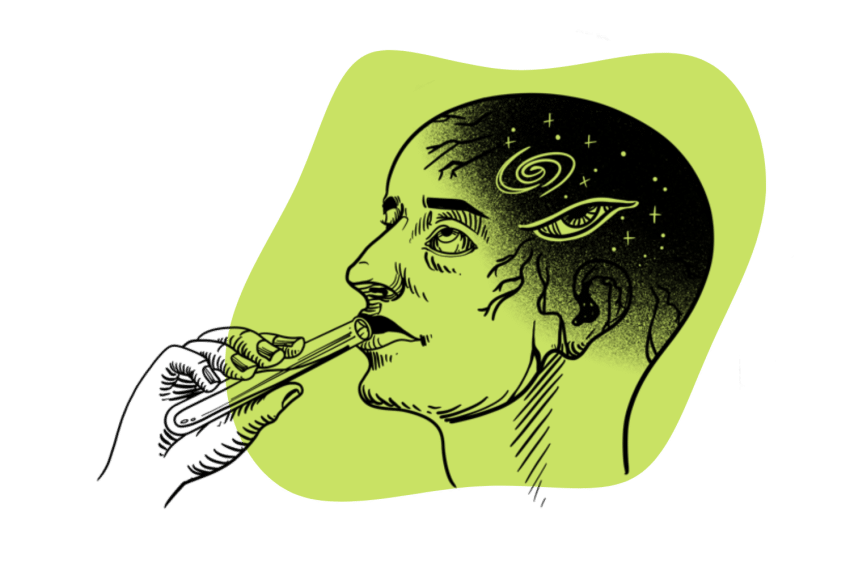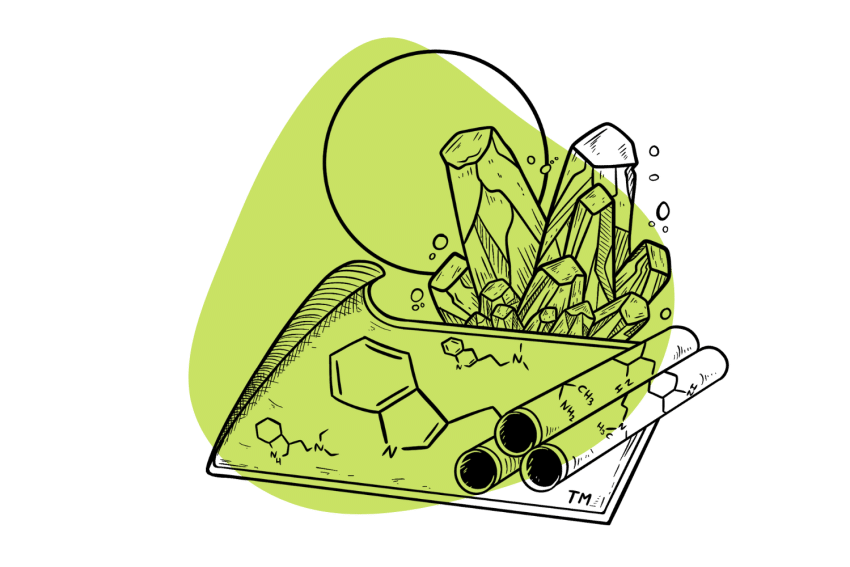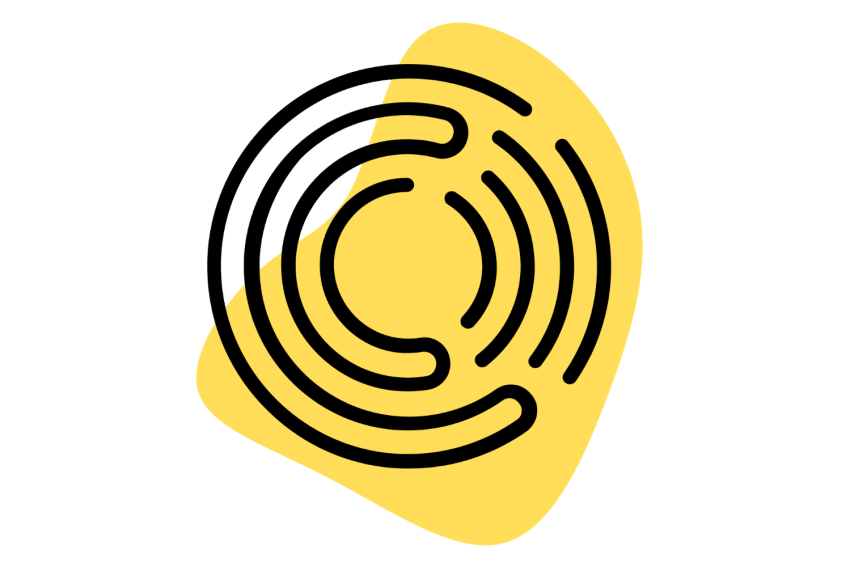HaluGen: Genetic Testing For Psychedelics
Is your body and mind suited for psychedelic use? HaluGen, a psychedelic gene test, promises to uncover your sensitivity to psychedelics so you can adjust accordingly.

Can we predict a “bad trip”?
Between sublime transcendent trips and psychedelic nightmare experiences that forever change the psychonaut’s mind — a psychedelic drug can take you to unexpected places.
Studies show that genetics can influence your experience with these drugs. So if you’re on a mission to uncover what to expect when taking psychedelics for mental health, psychedelic testing might be here to help.
This article gives an overview of HaluGen, a genetic test that screens for genes that influence your response to certain psychedelic drugs.
We discuss what HaluGen is, how it works, what are its pros and cons, and whether it’s worth trying. Here’s what to expect.
What is Genetic Testing for Psychedelics?
Psychedelic genetic testing is like regular genetic testing, but it predicts your response to certain psychedelic drugs.
It’s a window to the spectrum of potential responses your genetics triggers to a certain psychedelic substance.
Its primary focus is predicting your chances of experiencing a “bad trip.”
Because of this, it can also be used for medical purposes.
Research conducted by the University of North Carolina revealed that gene mutations could impact the effectiveness of psychedelic drug treatment for mental health conditions like anxiety and depression.
The FDA has granted psilocin and LSD (lysergic acid diethylamide) breakthrough status for their therapeutic potential for treatment-resistant depression and existential anxiety.
Because people respond differently to psychedelic medicine, conducting a genetic test could explain the genetic differences in people with similar reactions.
What is HaluGen?
HaluGen is the first ever Psychedelic Genetics Test Kit designed to give people considering psychedelic-assisted therapy a personalized look into treatment outcomes based on their genetic profile.
This test is created by HaluGen Life Sciences, a Vancouver-based start-up. It’s available commercially for CAD $89 and provides the user with a report through a smartphone app.
The test works on gold-standard Polymerase Chain Reaction (PCR) technology — a well-established method that allows scientists to make multiple copies of tiny sections of DNA or RNA.
It has multiple applications, including diagnosing infectious diseases and spotting genetic changes. The PCR testing method is currently used for COVID-19 detection because it can distinguish genetic material from a pathogen or abnormal cell sample.
The test is processed at the company’s testing facility in Toronto, Canada, in a controlled environment. The company claims to analyze a few important genetic markers and destroy the DNA sample after being used. They also promise not to sell, lease, or rent your genetic material to a third party without your consent.
How Does HaluGen Work?
So, how can this test predict a “bad trip”? Most importantly, what sort of information you’ll walk away with after testing?
Pharmacogenomics — or genetic testing for how the body responds to a particular medicine — has been performed in patients for years. It determines the effectiveness or potential harm of a certain drug to the body or mind based on certain gene variations.
For example, pharmacogenomics has been used to discover the gene variant in patients who don’t get relief from codeine. Influenced by their genetic code, patients’ bodies don’t create the enzyme needed to break codeine into morphine, which hinders the process of receiving proper care [1].
According to experts, 99.5% of people have at least one change in their genome that may cause a medicine not to activate or become less efficient over time.
Genotyping is the primary method of clinical pharmacogenomic testing. Genotyping is the process of investigating your genetic constitution for variations known as Single Nucleotide Polymorphisms (SNPs) at specific bases in your genome. Tests like 23andMe and HaluGen use this method.
Genetic tests look for variations or SNPs that can tell how your DNA can affect your chances of developing a health condition. It can also tell you which health issues you may pass down to your children — and how your body will react to a certain drug, psychedelic or not.
HaluGen is designed to look for a gene variation that creates a higher density of serotonin receptor 5HTR2A. It is theorized that this gene variation makes the person more sensitive to the effects of psychedelics. Because the exact genes that influence psychedelic experiences are unknown, the whole theory is that a higher density of the 5HTR2A serotonin receptor groups makes the user more sensitive to psychedelics. So, people who have more of these receptors are expected to experience a stronger psychedelic trip.
The test aims to uncover three key things:
- Personal sensitivity to classical psychedelics
- Your body’s response to ketamine
- Short and long-term risk factors associated with psychedelics use
According to their website, the test is strictly for educational, not diagnostic purposes. Keep this in mind if you plan on using it because you shouldn’t take the test too seriously. We’ll see why later in this article.
How to Use HaluGen: Setup & Test Results
HaluGen comes with a test kit that contains instructions on how to use it and a prepaid shipping envelope sent directly to your home.
Once you get the kit, you’ll need to register it at their official website, swab your cheek, and return the kit in the prepaid shipping envelope.
When your results are in, you get notified on the app, and you can explore a personalized report on your sensitivity to psychedelics.
If the results show normal sensitivity to psychedelics, your gene variation is not associated with increased or decreased receptor density.
If the results show increased psychedelic sensitivity, that’s an indication that you might experience a “bad trip.”
The Test Analyzes Five Genes
HaluGen looks at five genes that peer-reviewed research considers important in how the body metabolizes psychedelics or increases the risk of adverse mental effects.
Three gene variants are claimed to influence the mental health risk of psychedelics consumption, one gene variant on how slow or fast the body metabolizes ketamine, and one that influences the density of your serotonin receptors.
Based on these variants, they conclude whether or not the person is at a higher risk of experiencing a bad trip or should be more cautious when taking psychedelics.
Once you’ve done the test, you’ll receive five separate reports on results on gene variants, including:
1. HTR2A Gene: Classical Psychedelics Report
As the name implies, the classical psychedelics report provides information on how your body responds to psilocybin, DMT, mescaline, and LSD — through the expression of the gene HTR2A.
A study revealed that the way people respond to psychedelic drugs may be determined by common genetic variations in the serotonin receptor 5-hydroxytryptamine (5-HT2A). This gene — according to research studies — influences the baseline expression of the HTR2A serotonin receptors activated by classical psychedelics. The authors of the study conclude that these genetic variations may help explain why psychedelic therapies are more effective in certain patients than others.
Variations in the 5-HT2A serotonin receptor change the activity of 4 psychedelic therapies, including psilocybin, LSD, DMT, and mescaline. According to the study, some genetic variants uniquely affect the receptor’s response to the 4 psychedelics.
When activated, this receptor releases neurotransmitters in the brain, which can cause you to hallucinate or experience other effects that characterize a “classic psychedelic trip.”
So, how does testing this genetic variant help you discover how your trip will go?
It all has to do with the theory that this genetic variant can increase serotonin receptor density. Higher receptor density in people carrying the HTR2A genetic variant makes them susceptible to a stronger hallucinogenic experience.
So if your report shows that you carry the HTR2A genetic variant, this means that you should be “more cautious when considering” classical psychedelic therapies. Psychedelics mimic the effects of serotonin, and serotonin receptors are potentially involved in the modulation of depression.
Is there evidence against this report?
Yes, some studies show that a single dose of LSD, a classical psychedelic, doesn’t alter gene expression of HTR2A. Scientists admit that there are many unknowns regarding how psychedelics affect the brain and that gene mutations change how the body metabolizes psychedelics only to a modest degree [2].
2. BDNF Gene: Ketamine Response Report
This report provides information on how quickly your body reacts to ketamine (an arylcycloheyxylamine and dissociative).
Research studies show that the individual’s response to ketamine is influenced by how this drug affects the brain-derived neurotrophic factor (BDNF) gene. When ketamine is administered, the body secretes BDNF protein that’s influenced by the BDNF gene [3].
The gene assists with the growth and maintenance of novel neurons and synapses. Novel neurons are key for establishing a normal connection between mood and the brain.
Stress and anxiety can inhibit the production of this gene and lead to the development of mood disorders like PTSD and depression. As a result, carriers of a BDNF gene variant responsible for impairing secretion of the BDNF protein are more prone to a decreased response to ketamine therapy on depression [4].
3. CYP2B6 Gene: Ketamine Metabolism Report
The ketamine metabolism report analyzes the CYP2B6 gene, which is responsible for how the body metabolizes ketamine via the liver [5].
Some people have a genetic variant that influences the production of a liver enzyme to assist ketamine metabolism in the bloodstream. People carrying this genetic variant are prone to slower metabolism of ketamine up to 3 times compared to those who don’t.
The report gives insights into the intensity and duration of a ketamine experience and whether the person metabolized the drug slowly. If you are carrying this gene variant, this information should make you more cautious when taking ketamine.
People who metabolize ketamine more slowly may experience increased duration and higher intensity of effects. The goal of the report is to help clinicians dose ketamine more carefully in their patients when undergoing ketamine-assisted psychotherapy.
4. LSD, MDMA, Ayahuasca Metabolism Report
This report is based on how the body metabolized LSD, MDMA, and ayahuasca based on the presence of a CYP2D6 gene variant.
According to HaluGen’s research, people who carry this gene variant that influences the production of liver enzymes that help with metabolizing these drugs might metabolize these psychedelics twice as slowly as people who don’t.
Similarly, people with this gene variant are warned that they should lower their dosage because they are more likely to experience an intensive and long-lasting trip than the average person.
5. NRG1, DICS1 & C4A Mental Health Risk Report
Can your genes predict how likely you are to develop a certain mental health disease throughout your life?
If you look at your family’s mental health history, you may notice that some mental health conditions, like autism, ADHD, schizophrenia, depression, and bipolar disorder, run in families.
According to HaluGen’s research, three genes, including NRG1, DISC1, and C4A, influence the genetic risk of adverse mental health effects from psychedelic use. While there’s no specific “depression mutation” gene, genetics play a role in hereditary mental health conditions within a family.
Overexpression of C4A Gene
The C4A gene is involved in a process called “synaptic pruning.” This process assists the brain to mature from adolescence to adulthood. The C4A gene essentially “cleans out” neutral connections, so there’s room for the creation of more complex pathways in the brain.
People carrying more copies of this gene may experience a more disorderly “cleanup,” which theoretically could lead to an increased risk of developing a mental health illness [6]. Therefore, people who have a greater risk of developing a mental health condition should avoid psychedelic drugs, which requires further discussions and research.
Overexpression of NRG1 Gene
The overexpression of the neuregulin 1 (NRG1) gene is thought to increase the likelihood of a person developing psychosis. Because of this risk, it’s recommended that these people avoid psychedelics [7].
The NRG1 gene is the opposite of C4A proteins because it helps promote the growth of new neurons. This process is vital for short-term learning and long-term memory formation.
DISC1 Gene
There’s a link between the disrupted-in-schizophrenia (DISC1) gene and an increased risk for psychosis, bipolar disorder, and schizophrenia. This gene is involved in processes vital to proper brain development [8].
People with a certain genotype are considered at a higher risk for developing these mental health conditions. To be on the safe side, they are recommended to stay away from psychedelic drugs.
How Accurate is HaluGen? Pros & Cons of Genetic Testing for Psychedelics
The main issue with this test is its reliability.
While claimed to serve strictly educational purposes, HaluGen is also touted as a reliable predictive tool that gives the user insights into their psychedelic journey.
The problem is that a person may resist treatment based on their potentially inaccurate DNA reports. This could hold them back from a life-changing experience with psychedelic-assisted therapy.
Many people approach psychedelic healing in a vulnerable state. And if they take this test, they may rely on it for guidance on what to expect on their trip.
If the test’s results don’t match the outcome of the therapy, they are facing a risk of worsening mental health. This is why it’s important to take the test’s final results with a grain of salt and rely on experienced people to guide you through your psychedelic-assisted psychotherapy.
Scientific Criticism of Halugen
Shayla Love, a journalist at VICE, and one of her colleagues tried HaluGen testing. The author of the article, Shayla, and her colleague received dramatically conflicting results from the reality they’ve experienced when talking about psychedelics.
Shaya has only had “bad” trips through their experience, while her colleague has had only “good” trips. But the test reports showed a different picture.
The author of the article consulted scientists about the accuracy of the claims about the genetic testing of HaluGen. They’ve stated that two of the genes the test claims influence mental health have been scientifically discredited or overstated.
The main issue with tests like these is that they can lead the person into deception about what to expect and how to dose psychedelics. As a result, it may make them rely on themselves instead of seeking expert medical guidance.
If someone’s test doesn’t show any genetic variants that could potentially influence their trip in a negative way, this might deter them from focusing on how to safely practice psychedelic use.
If mental health diseases run in families, telling someone they are at risk of getting a certain type of mental disorder — over an application — can worsen their mental health and push them into despair.
A professor who researches serotonin receptors told VICE that the test is unreliable because the density of serotonin receptors might be one of many perimeters we should be looking at.
Other predictors, like signaling, desensitizing, and similar, could provide insights into why a person experiences specific effects.
While it’s true that the intensity of psychedelic effects is related to the amount of receptors stimulated by psilocybin, we need more research on this topic [9].
The number of receptors someone has might correlate to the subject’s experience, but it’s the number of activated receptors that influences the intensity of the experience.
As a result, those people with higher intensity of serotonin receptors might need a higher dose to effectively stimulate the extra receptors.
Final Thoughts: Should You Try HaluGen?
You certainly can try HaluGen for yourself.
But, it’s important to be aware that this test is meant only to educate and not diagnose — so take it with a grain of salt.
Patients with different genetic variations are expected to react differently to psychedelic-assisted treatments. Therefore, it is recommended that physicians perform a gene mutation test on their patients before starting psychedelic-assisted therapy. Knowing the genetic mapping of a patient allows them to choose the right psychedelic for the person and at the right dose.
So, if you want to try psychedelics for mental health, consult an experienced service provider or someone who can help you practice harm reduction. And don’t, under any circumstances, expect or base your potential experience on the results of the test.
References
- Dean, L. (2016). Codeine Therapy and CYP2D6 Genotype. Medical Genetics Summaries.
- Dolder, P. C., Grünblatt, E., Müller, F., Borgwardt, S., & Liechti, M. E. (2017). A Single Dose of LSD Does Not Alter Gene Expression of the Serotonin 2A Receptor Gene (HTR2A) or Early Growth Response Genes (EGR1-3) in Healthy Subjects. Frontiers in Pharmacology, 8.
- Woelfer, M., Liu, L., Colic, L., Liebe, T., Di, X., Biswal, B. B., Murrough, J. W., Lessmann, V., Brigadski, T., & Walter, M. (2020). Ketamine-induced changes in plasma brain-derived neurotrophic factor (BDNF) levels are associated with the resting-state functional connectivity of the prefrontal cortex. World Journal of Biological Psychiatry, 21(9), 696–710.
- Liu, R., Lee, F. L. F., Li, X., Bambico, F. R., Duman, R. S., & Aghajanian, G. K. (2012). Brain-Derived Neurotrophic Factor Val66Met Allele Impairs Basal and Ketamine-Stimulated Synaptogenesis in Prefrontal Cortex. Biological Psychiatry, 71(11), 996–1005.
- Langmia, I. M., Just, K. S., Yamoune, S., Brockmöller, J., Masimirembwa, C., & Stingl, J. C. (2021). CYP2B6 Functional Variability in Drug Metabolism and Exposure Across Populations—Implication for Drug Safety, Dosing, and Individualized Therapy. Frontiers in Genetics, 12.
- Kim, M. S., Haney, J. R., Zhang, P., Hernandez, L. M., Wang, L., Pérez-Cano, L., Loohuis, L. M. O., De La Torre-Ubieta, L., & Gandal, M. J. (2021). Brain gene co-expression networks link complement signaling with convergent synaptic pathology in schizophrenia. Nature Neuroscience, 24(6), 799–809.
- Jagannath, V., Gerstenberg, M., Walitza, S., Franscini, M., Heekeren, K., Rössler, W., Theodoridou, A., & Grünblatt, E. (2018). Neuregulin 1 (NRG1) gene expression predicts functional outcomes in individuals at clinical high risk for psychosis. Psychiatry Research-neuroimaging.
- Fu, X., Zhang, G., Liu, Y., Zhang, L., Zhang, F., & Zhou, C. (2020). Altered expression of the DISC1 gene in peripheral blood of patients with schizophrenia. BMC Medical Genetics, 21(1).
- Madsen, M. B., Fisher, P. M., Burmester, D., Dyssegaard, A., Stenbæk, D. S., Kristiansen, S., Jørgensen, M. B., Lehel, S., Linnet, K., Svarer, C., Erritzoe, D., Ozenne, B., & Knudsen, G. M. (2019). Psychedelic effects of psilocybin correlate with serotonin 2A receptor occupancy and plasma psilocin levels. Neuropsychopharmacology, 44(7), 1328–1334.








